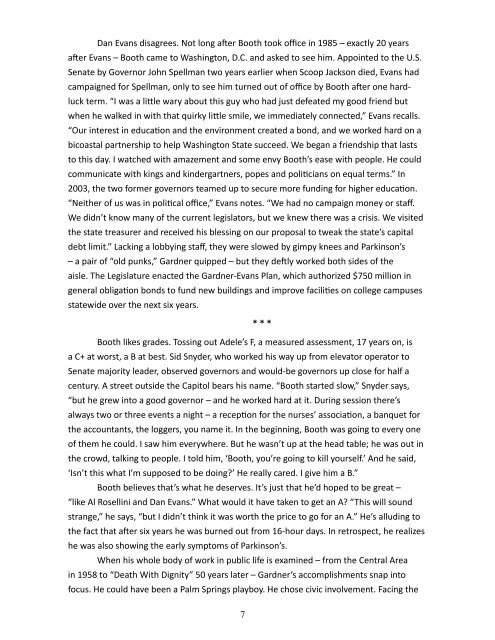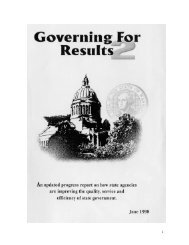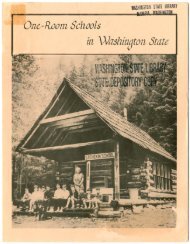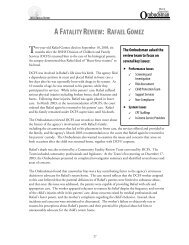BOOTH WHO? - Washington State Digital Archives
BOOTH WHO? - Washington State Digital Archives
BOOTH WHO? - Washington State Digital Archives
You also want an ePaper? Increase the reach of your titles
YUMPU automatically turns print PDFs into web optimized ePapers that Google loves.
Dan Evans disagrees. Not long after Booth took office in 1985 – exactly 20 years<br />
after Evans – Booth came to <strong>Washington</strong>, D.C. and asked to see him. Appointed to the U.S.<br />
Senate by Governor John Spellman two years earlier when Scoop Jackson died, Evans had<br />
campaigned for Spellman, only to see him turned out of office by Booth after one hardluck<br />
term. “I was a little wary about this guy who had just defeated my good friend but<br />
when he walked in with that quirky little smile, we immediately connected,” Evans recalls.<br />
“Our interest in education and the environment created a bond, and we worked hard on a<br />
bicoastal partnership to help <strong>Washington</strong> <strong>State</strong> succeed. We began a friendship that lasts<br />
to this day. I watched with amazement and some envy Booth’s ease with people. He could<br />
communicate with kings and kindergartners, popes and politicians on equal terms.” In<br />
2003, the two former governors teamed up to secure more funding for higher education.<br />
“Neither of us was in political office,” Evans notes. “We had no campaign money or staff.<br />
We didn’t know many of the current legislators, but we knew there was a crisis. We visited<br />
the state treasurer and received his blessing on our proposal to tweak the state’s capital<br />
debt limit.” Lacking a lobbying staff, they were slowed by gimpy knees and Parkinson’s<br />
– a pair of “old punks,” Gardner quipped – but they deftly worked both sides of the<br />
aisle. The Legislature enacted the Gardner-Evans Plan, which authorized $750 million in<br />
general obligation bonds to fund new buildings and improve facilities on college campuses<br />
statewide over the next six years.<br />
* * *<br />
Booth likes grades. Tossing out Adele’s F, a measured assessment, 17 years on, is<br />
a C+ at worst, a B at best. Sid Snyder, who worked his way up from elevator operator to<br />
Senate majority leader, observed governors and would-be governors up close for half a<br />
century. A street outside the Capitol bears his name. “Booth started slow,” Snyder says,<br />
“but he grew into a good governor – and he worked hard at it. During session there’s<br />
always two or three events a night – a reception for the nurses’ association, a banquet for<br />
the accountants, the loggers, you name it. In the beginning, Booth was going to every one<br />
of them he could. I saw him everywhere. But he wasn’t up at the head table; he was out in<br />
the crowd, talking to people. I told him, ‘Booth, you’re going to kill yourself.’ And he said,<br />
‘Isn’t this what I’m supposed to be doing?’ He really cared. I give him a B.”<br />
Booth believes that’s what he deserves. It’s just that he’d hoped to be great –<br />
“like Al Rosellini and Dan Evans.” What would it have taken to get an A? “This will sound<br />
strange,” he says, “but I didn’t think it was worth the price to go for an A.” He’s alluding to<br />
the fact that after six years he was burned out from 16-hour days. In retrospect, he realizes<br />
he was also showing the early symptoms of Parkinson’s.<br />
When his whole body of work in public life is examined – from the Central Area<br />
in 1958 to “Death With Dignity” 50 years later – Gardner’s accomplishments snap into<br />
focus. He could have been a Palm Springs playboy. He chose civic involvement. Facing the<br />
7
















